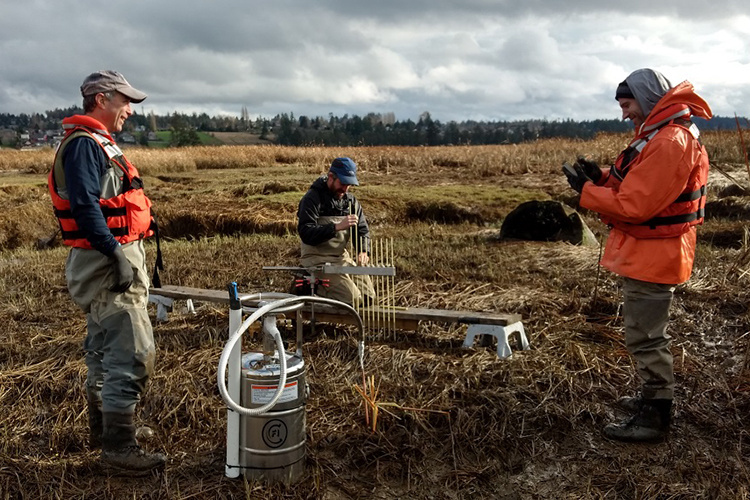Veterans Become Budding Marine Scientists Through Internship
Posted
Last Updated
In the Puget Sound region of Washington, Kate Rovinski helps study Dungeness crabs at NOAA’s Mukilteo Research Station, part of the Northwest Fisheries Science Center. The crabs are the target of a valuable West Coast fishery at high risk to the effects of ocean acidification. Rovinski got started in the lab through a promising new pathway for veterans in marine science: the NOAA Washington Department of Veterans Affairs Veterans Conservation Corps Internship Program.
The internship program allows veterans to be part of marine science research teams. Work includes both lab and field experiences in a range of disciplines related to the health of Puget Sound, including salmon recovery and ocean acidification.
Field work in particular can provide the veterans with valuable “ecotherapy”—referring to the therapeutic benefits of interacting with nature. Ecotherapy can help veterans who are experiencing post-traumatic stress syndrome, or who are transitioning back to their communities following military service.
Rovinski is one of a number of veterans who have completed the internship. Many graduates of the program go on to work in fisheries with local tribes or to study marine science in graduate school. Rovinski didn’t have much field experience when she applied, but volunteer experience at a salmon hatchery and as an educator deckhand on the Schooner Adventuress made a difference.
“Don’t let perceived lack of experience hold you back from applying if you’re passionate about conservation, especially if ecotherapy resonates with you,” said Rovinski. She encourages veterans who have a strong interest in the marine environment to consider the opportunity.
The program was created in 2016 through a partnership between the NOAA Restoration Center, NOAA Fisheries West Coast Region, Northwest Fisheries Science Center, and the Washington Department of Veterans Affairs Veterans Conservation Corps. We are recruiting participants for the program at a number of NOAA research stations in Washington next year, including Montlake, Mukilteo, and Manchester.
The internships can be enormously varied within the field of marine science, spanning from stream restoration to planting native vegetation and more. A special new focus next year will include internships focused on developing careers in seaweed aquaculture.
Rovinski advises future recruits to savor the experience and use it to find their path. “To anyone interested in the program, it is an amazing opportunity where so much is offered to you,” she said. “Take time often to figure out which slice you want for yourself.”
READ MORE at fisheries.noaa.gov

